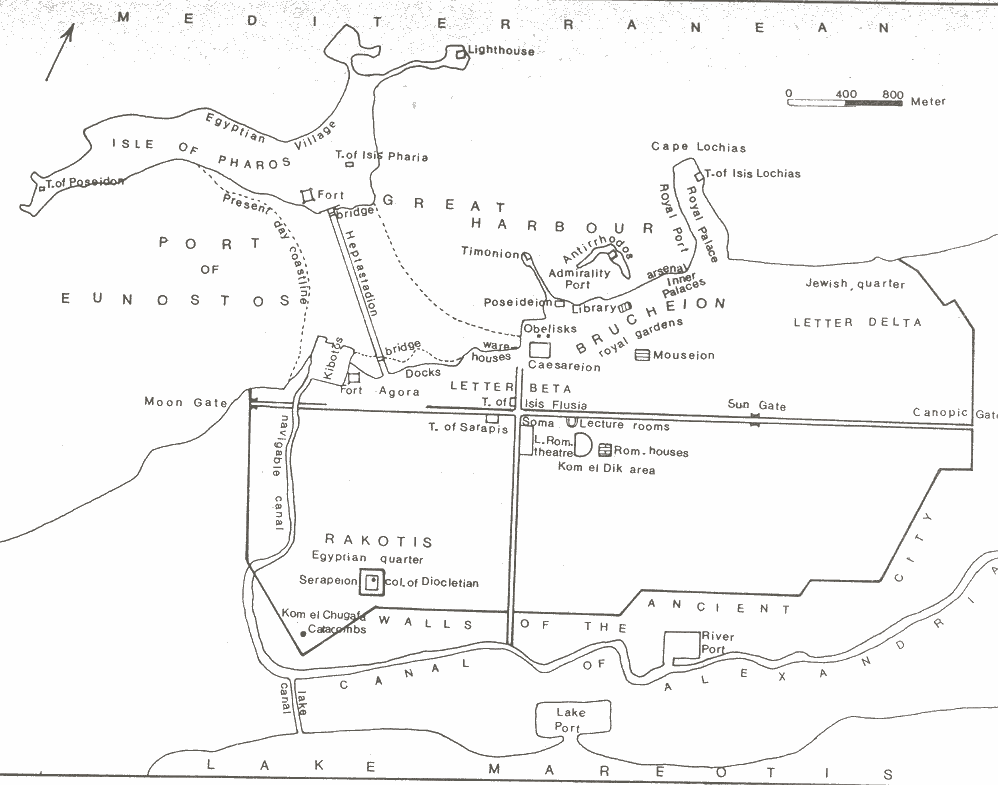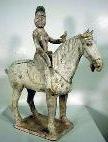
- LOTE13 Home
- Getting Started
- Rules Addenda
- Campaign Maps
- The Newsfax
- Starting Positions
- Files to Download
- A Bibliography
- Get the LOTE Rulebook
- Main LOTE Page

A Twilight of Empires
Lords of the Earth, Campaign 13

Newsfax, Turn 12
(start of 445 CE through the end of 448 CE)
Notes:
- Only three players failed to use the proper form for orders. Thanks to the rest of you!
- Please remember to use the Custom Units information on your stats sheet for such things as gp and nfp costs, APs, etc.
- Any sons and daughters not married off or promoted may form the nucleus of a revolt, so to coin a phrase, "Think of the children!"
- You are encouraged to submit text and images for inclusion in the newsfax, which may satisfy your need for propaganda, creativity, or fun.
- At the bottom of the newsfax is a rules hint, usually a choice nugget right from the GMs rulebook. See earlier turns for more of these.
As is traditional, here is what I listened to while processing this turn. Three rocks.
- Berlin Philharmonic, Hans von Benda - Music from the court of Frederick the Great
- Catherine Wheel - Ferment
- Kitaro - Tunhuang
- Slowdive - just for a day
- Vera Lynn - The Early Years, Vol. 1: 1936-1939
- Motörhead - No Remorse
- Moby - Animal Rights
- Pale Saints - The Comforts of Madness
- Dead Can Dance - eponymous
- The Cramps - Greatest Hits
- Sixteen Horsepower - Sackcloth n Ashes
- KUOM - www.radiok.org
- KCPW - www.kcpw.org
Generally eastward starting with ...
Central Asia
Hephthalite Khanate
(Asiatic Pagan Nomadic Open Empire)Ikram the Fair, Khakhan of the Hunas
Diplomacy:
Two events showed a further deterioration in the state of the Khanate. One was the untimely death at the age of 34 of Ikram's heir, Ashirbu. This popular prince was mourned generally, and he left Gul, the daughter of Ilgince and Umay, a widow.
More ominous was the Gupta invasion in support of the Kushans (see Kushan Empire) in Gandhara. According to one report the Indians "covered the valley floor" and brought thousands of elephants, each filled with armored warriors. The Khakhan was not pleased, but chose to bide his time and look for favorable omens.
White Turk Khanate
(Asiatic Pagan Nomadic Open Empire)Khan Bushir
Diplomacy:
At the age of 59 Osman passed away due to heart trouble. His heir, the great-grandson of Fittcheen, acceded on the strength of his party at court. The young Bushir promptly sired a daughter on his Slav concubine, which was received as a good omen.
Khwarizm Hunas Khanate
(Asiatic Pagan Civilized Open Empire)Alpiv Alchon, Khakhan of the Hunas, Khan of Khwarzim
Diplomacy:
Alpiv watched regional events with some concern. But not much.
Steppe Shamanism
(Asiatic Pagan Nomadic Primate Religious Authority)Ikram Sechen, High Shaman
Diplomacy:
A new program to improve the quality of epigraphy lead to a number of injuries but better work.
Kushan Empire 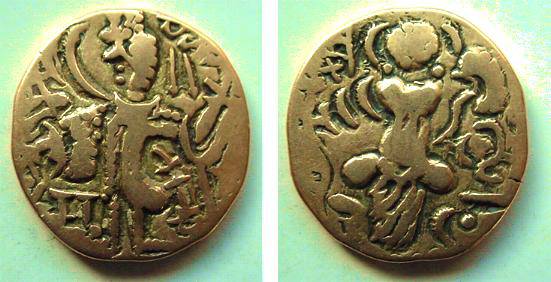
(Buddhist Civilized Open Empire)Lakshmi, Queen and Regent for the Kidarite Shao
Diplomacy: Hazarajat (P), Kandahar (P), Gandhara (A), Kash (P)
The winter of 444-445 was a hard one, and a few families fled from the countryside into Kabul to escape hunger. Grain production continued to be a problem, and the Queen did what she could. One boost to local morale was the marriage of her son, Prince Shaka, to a sturdy local girl of good family. They quickly produced children, providing positive gossip for a happy-news craving public.
Those men in the army knew that while away from their families they at least would be fed, usually, and so were happy to march west along the trade routes into Hazarajat. Lead by Eucratides, Banesword, and Safeen the Hephthalite, the composite force faced off against the tiny remnant of Abandanes' force (see last turn for more ...). These were either slain or fled with Abandanes, who escaped to Ghazni. There he gathered about him Persians and other refugees and bandits into a mercenary force up for hire, who otherwise set up protection rackets and generally were a nuisance.
The Persian princes Mazdak and Xerxes found the Kushan army in Hazarajat more than a nuisance. Mazdak arrived in the land in August of 445 hoping to lure Abandanes and the local Hazaras back to Persian fold. Instead he found himself dodging Hephthalite horse archer patrols and finally gave up the effort. His brother Xerxes showed up in the mountains and together they decided to instead attempt to woo the free trade city of Herat back into the empire (see Sasanian Persian Empire).
In Hazarajat the Kushan force was a welcome change from the Persians. Eucratides received envoys from Kandahar, and within days walked into the city with a small guard and accepted its capitulation. Pleased with this development, the Kushans marched into Kash. This rupture of the Persian border was a complete success, the local clans being cowed into submission.
With a little help from his friends (see Empire of the Guptas) Lakshmi's husband Jayapala the One-Armed retook his homeland. There was much rejoicing.
Oghuz Turk Realm 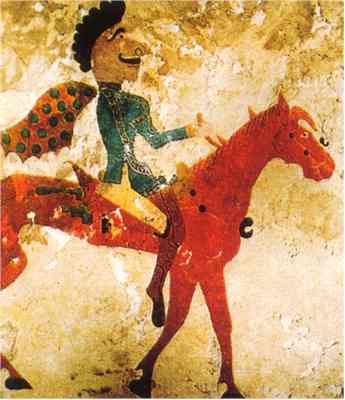
(Monophysite Christian Nomadic Open Empire)Khan Bogotai the Lame
Diplomacy: Atelzuko (UN), Thracia (PT)
The lands of Atelzuko had grown stale in the hearts of the tribes. The teenaged Khan sensed this, as did others far away. Thus it was that when the ground hardened and a scattering of flowers dotted the marshes at the mouths of the Boresthenes, Bogotai made the following speech before a gathering of the clan leaders in 445:
Men, it is at the request of foreigners that we traveled so far. And our journey has not been without loss. The Tabolsk lost many men, a loss that still is close to your hearts. But the one loss we all feel is the loss of Lord Sonqur Khan. This journey was his in the making, and to be his last it seems.But I tell you! My people! We will finish what he started! The Oghuz shall not fail him!
Bogotai turns his horse and points south.
Before you stands the Eastern Roman Empire. Not long ago it was they that gave Sonqur the titles of 'Rex Turcorum' and 'Magister Equitum per Orientem'. Those titles are just that, titles. The Eastern Roman Emperor, in his actions against the Lakhmids, has dishonored himself. We owe him nothing. None shall be free so long as this threat remains. Do you value your freedom? Then fight!
A cheer rose up from the assembled men. Bogotai drew his sword and held it high.
So ride now! Ride! Ride for freedom! Ride for ruin! And for the world's ending!
Such a fire and bloodlust was in Bogotai's eyes than none dared to look into them. With a cry of "Death!" the khan began his invasion into the Eastern Roman Empire.
The gurkhan Shaybani was put in charge of the tribes, at which he winced noticeably. Getting the children especially to move in a single direction was always more work than keeping track of the warriors. Bogotai also ordered Ramim, shah of the Chorasmians, Burak, khan of the Burak, and Batu, khan of the Karluk, to allow the gurkhan to lead their families while their warriors go raiding and pillaging.
They refused. After Shaybani had calmed the impetuous Bogotai, who had raved that these leaders were traitors and agents of the Devil, they were allowed to travel with the Oghuz clans. Thus it was that the gurkhan of the Oghuz and many lesser khans paid a visit to Arpad, Khan of the Alans and Ghuzz, a man grown old waiting for an opportunity for glory and loot. After some years he consented to the marriage of 14-year-old Api, youngest daughter of the late khan Respendial and his ward, to Bogotai. This was only on the condition that the Alans, Turks, Goths, and others under his banner be free to keep their own loot and worship their own gods. Arpad loathed Dead God lackeys generally, but knew he had only a few years left to achieve his dream of death and glory. But Prince Gursabur the Bitter was overheard to remark, "What a drag." Thus the Tyrasean Alans joined the horde.
Thus greatly enhanced, Shaybani's force moved into the plains of Wallachia. None dared deny them passage through Moldavia and Ialomita. These finally landed in Thracia ...
Meanwhile Bogotai was leading his warriors the Danube into Moesia II, which was unwilling to resist them, having first left the empire and then devolved into dozens of feuding despotates. Tomi was relieved to see the horde pass by, but did send letters to Constantinople and to Titus Pollo, who commanded the Army of Moesia. He immediately set forth into the nearest imperial province on the enemy line of march, Thracia. He knew that the long-neglected frontier would not be able to resist even a hundred barbarians, let alone the thousands rumored to be on the move.
Spring of 446 saw the Oghuz probe across the border into Thracia and rapidly Bogotai determined there would be no resistance. 20,000 warriors swarmed across the land, seizing everything not nailed down, driving peasants into the woods and torching the occasional fortified manor. Much to the relief of the locals the imperial army marched into the province and began skirmishing with the Oghuz. The two lined up for a battle at the small city of Diocletianopolis, on the via just north of Phillippopolis, on May 12 of 446.
As seemed traditional, the imperial army, mainly equites Illyricani - some of them indiginae and some of them Huns - assisting an understrength legion of legionarii and support troops, were vastly outnumbered by the barbarians. And yet Titus Pollo knew his duty, all the while cursing the imperial bureaucrats for allowing the Duchy of Moesia to fall away. While many of his men claimed they would follow Titus to Hell itself, none expected such a close brush with that reality.
With only a quarter the troops of the enemy, Titus put his engineers to work fortifying the town and putting a ditch on his other flank. Bogotai responded by sending his nobles and mounted axemen against Diocletianopolis as the rest of the army, mainly steppe horse archers trained to put an arrow into a snow leopard's head at the gallop, harassed the legionarii and traded shots with the Roman horse. The armored nobles and axemen dismounted just outside the town and assaulted the buildings, roadblocks, and abatis defended by engineers.
In a word, the Romans were overwhelmed and the remainder driven back into the town. Bogotai, sensing victory over the Heretics, lead a squad of nobles against the church Titus was using as his command post. Urban warfare was, however, new to the Turks and old hat to the Romans, and the Khan found himself with just a few bodyguards trying to hold onto the narthex. A 20-year-man perched on a statue of the Virgin Mary (his religion was the legion) threw a javelin that hit Bogotai in the hip at an uncovered join where his armor had earlier given way, and the Khan went down.
More Turks showed up just then and ushered their leader out the shattered door and away. The barbarians fell back from the town, and night fell. This allowed Titus the opportunity to gather his remaining men, only 1600 out of an original force of 5000, and retire to Phillippopolis. The Turks did not pursue, but rather tended to their young Khan, and the Romans made an orderly retreat to Dardania. From Naissni Titus sent several letters to court, explaining the need for reinforcement and the hopelessness of his position, just as a few other officers posted other notes blaming the loss on their commander's incompetence. In other words, standard operating procedure.
Thus the Turks captured the border province of Thracia but Bogotai made no further progress. Able to walk and ride only by the summer of 447, he would thereafter be known as "The Lame," a name he wore with pride.
Meanwhile, Ramim the Shah of the Chorasmians and Batu, Khan of the Karluks, arrived just in time to assist the Oghuz in looting Thracia in the Fall of 446. Churches were an especial target, dozens of them being sacked and razed though to little profit. Together Bogotai the Lame and Ramim moved their troops into Europa, knowing that no imperial force remained west of Constantinople to impede them. The land was ravaged up to the walls of Heraclea by the nomad chevauchée, with Ramim stopping an arrow launched from the walls of that city. The Khan survived, but was eager to return to his people, none of whom cared that because of the tide of "immigrants" the maintenance on the Novae-Tomi road fell behind and it became useful only for post riders.
Blue Turk Khanate - Tribe of the Oghuz Turks
(Asia Pagan Nomadic Component Nation)Bardus, Khan of the Blue Turks
Diplomacy:
Tardu and his forces gathered along with the Oghuz forces while Bogotai gave his speech before the invasion. Tardu, listening to Bogotai's speech, suspected that Sonqur's Monophysite faith might have influenced the decision the leave. But he did not care. Bogotai had instructed Tardu to do whatever damage he could to as much of Greece as possible. So Tardu took his Turks and raided western Greece, all the way down to Achaia.
Bardu, the heir, marched the families into Wallachia without any warriors to guard them. Having realized this only on entering the new land, he quickly called the local leaders to him and explained the situation. They in turn pointed out that nobody was likely to be inclined to welcome thousands of smelly refugees: smelly and unarmed refugees. Bardu was not one to talk more than was absolutely necessary, and realizing the untenable situation his people were in decided to move on.
Indeed, abandoned by their men the families became quite fractious and difficult to manage. An attempt to cross the Danube into Dacia was turned back, and so the weary clans marched into Ialomita and thence into Moesia II. There the locals were still impressed by the thousands of barbarians who had lately run through their lands and allowed the nomads to pass unmolested. Eventually the tribes washed up in Thracia, the only land their warriors had conquered. When in 448 the men returned, be assured they heard an earful from their wives and mothers. Seeing the swag their warriors had brought mollified them only a little.
For their men had ridden through Dacia, Moesia I, Thessaly, and up to the very walls of Athenai before returning. Cem, Khan of the Ob tribes, and Erdal, Khan of the Kazan tribes, rode with Tardu, grabbing anything not tied down. There was no resistance from these long-peaceful lands, all the local lads being down in Egypt fighting different barbarians. Captured mules laden with loot, they returned to Thracia in 448. The exertions proved the undoing of Tardu, who passed away that November. Bardu was hailed as the new Khan, and all looked forward to more action in the coming years.
Uighur Khanate
(Asiatic Pagan Nomadic Open Empire)Hsiao Hsin, Khan
Diplomacy:
The Uighurs revered the 3-fold way.
Juan-Juan Khanate
(Asiatic Pagan Nomadic Open Empire)P'ulochen, Khakhan
Diplomacy:
Too many tribes, thought the Khakhan. It was giving him a headache just keeping track of them, not to mention the khans, their wives, kids, herds ... Thus he concocted the scheme of sending them to a distant land on a mission of conquest - or self-destruction.
The Khan of the Khalaka had agreed to migration and invasion. However, on returning to his tents he saw red circles painted on each of them. His eyes grew wide, his nostrils flared, and he knew fear. Such a sign could only mean he should look only to his own people and their needs and forget about what P'ulochen wanted. Within the watch he sent riders to gather the clans, and before the new moon the Khalaka were gone. Following the advice of a Chinese scribe the wagons trundled off to Lanchou, which they settled. His people hailed him as a visionary, having actually found them rich land in China.
Following the orders of the Khakhan, the rest of the tribes headed south out of the mountains and into history (see Chinese Kingdom of Annam). In 448 the Western Ts-in captain dies, and his troops filter away, heading home, joining mercenary bands, or hiring on as caravan guards. A daughter is born of Karmen the Ghuzz princess, and P'ulochen is pleased.
Eastern Mongolian Kingdom - Juan-Juan Sub-Khanate
(Daoist Nomadic Component Nation)Khan Khojan
Diplomacy: Ningsia (HM)
Longing for a home, Ningsia is settled by order of Khojan. Kublai is named a prince of the kingdom, but dies in 448. Offsetting this somewhat was the birth of another child sired by Khojan. And still the Mongols look to the Juan-Juan for evidence of their destiny.
Eastern Turkish Kingdom - Juan-Juan Sub-Khanate
(Asiatic Pagan Nomadic Component Nation)Naiman, Regent for Altakai
Diplomacy: Henyetin (UN)
With the foaling season in 445 came news that the Khan of the Henyetin had died. The new Khan was tired of promises and decided to take the clans back into the steppe. And so they did.
P'ulochen had ordered Prince Altakai to give his older sister Semolai in marriage to the Juan-Juan prince of the same name. Altakai was outraged at this and refused to "sell his family" to the Khakhan. But the tribal elders were more practical and knew that to refuse the Juan-Juan royals their due was suicide. Each side raged, yelled, and threatened, and various clans were busily choosing sides when Prince Altakai relented. Semolai had pleaded with him to let her go. She needed to wed, to find her own life, and Altakai reluctantly acceded.
Thus was a civil war avoided, but the Turks remained restive.
China
Chinese Buddhism
(Chinese Buddhist Civilized Primate Religious Authority)Master Lo-Wang III
Diplomacy:
Navels were contemplated, and most of the wisest priests agreed that some of them should remain well-hidden.
Chinese Kingdom of Annam 
(Daoist Civilized Open Empire)Wei-Chou Su "The Blood King"
Diplomacy: Manipur (P)
As was often the case, an elaborate lamp burned late into the night in one window of the royal palace. This was the study of king Wei-Chou Su and he was poring over reports from his agents in Manipur as part of his plans for the next few years. He slowly became aware of a something in the room with him. The king put down the papers and cautiously looked about the room. Nothing. Returning his gaze to the desk he saw a deep yellow document on top of the stack, which he had not seen previously.
He read it intently, got up, walked over to the shrine on the back wall and prayed.
The next morning Wei-Chou Su ordered a conclave of his generals. There was to be a war against the barbarian threat from a new direction. June of 445 saw the Annamese army marching into Nan Chao and immediately digging in across the mountain passes. This was timely, as the Zaysan tribes and Lemochen, Khan of the Wusu, were beginning to enter Nan Chao through heights still marked with patches of snow. As the nomads descended they were amazed at the green fields in the distance, such verdure as they had never known.
Nor would they, for as the barbarians debouched onto the plain at the base of the foothills the first patrols of Nan Chao troops began to harass them. Lemochen faced a large number of heavily fortified villages, constant running warfare, and far more well-equipped enemy than he had been lead to believe could be here. The Juan-Juan vassals pressed on through July, but eventually it became clear they could make no advance, and decided to retreat back through the mountains. The clans split up and trundled dispiritedly into the foothills. Here they found the rocks they had ridden past were now towers filled with troops, archers behind trees, and sudden attacks on their rears.
Piecemeal the would-be invaders were cut down or captured. None escaped the wrath of Wei-Chou Su, who personally lead the campaigning. Not satisfied with having thwarted this incursion, he ordered his army to march west along the ancient caravan route into Padishan, and by 447 they were attacking Manipur, expecting to find more barbarian raiders. But the land was free of them. The Padishan allies of Annam were happy, however, to begin a slaughter of the natives in Manipur, and thousands streamed south seeking aid from their nominal overlords the Pyu. For Princess Alyia of the Pyu had married the King of Manipur and, though now dead, was revered in memory. Thus did Wei-Chou Su come to be known as "the Blood King," most especially among the refugees huddled in huts in Burma.
Daoism Temples 
(Daoist Civilized Primate Religious Authority)Li Chan Fu, Ling Pao Master
Diplomacy:
The year 445 saw a new Master for the faithful, Li Chan Fu. He immediately secreted himself away with Xin Xiaobing the Beatific. Nobody confesses to understand what they are doing, but those around them realize that important work is taking place. And in fact, while unable to tell the monks what that work was, on 14 November 448 they announced a great success, and a modest celebration would be held.
Meanwhile, Mao Tze Tsu preached the Way in Lang Shan, finding some success among those barbarians before dying suddenly in 448. Mao Fu Yei travelled to the Temple of South Heng Shan "to meditate." Missionaries in Kin and Tumet made remarkable progress at enlightening the masses.
Eastern Ts'in Dynasty
(Daoist Civilized Open Empire)Zhang Ti, Emperor of China
Diplomacy: Chiennan (C)
An unexpected barbarian crisis (see Khanate of the Hsiung'nu) broke out on the Western Frontier, upsetting the tranquillity of the imperial court. Another cause for disquiet was the birth of a daughter to a merchant's neice, not an otherwise notable event but for the fact that her pregnancy was a secret as the sire was none other than the Crown Prince, Chin Ti. The Emperor was not amused.
Korean Kingdom of Koguryo
(Chinese Buddhist Civilized Open Empire)King Changsu
Diplomacy:
The Princess Lingsu was finally married off, rather late as most gossipped. But she duly produced a daughter and both amazed the experts by surviving. Prince Langtu died at 63, and few cared. Despite all these distractions, the court spent most of its time worrying about Bandao politics (see Hou Yen Dynasty).
Khanate of the Hsiung'nu
(Asiatic Pagan Nomadic Open Empire)Alagh, Khagan of the Hsiung'nu
Diplomacy: Ts'uk'an (UN), Manipur (UN), Chiennan (P)
The February wind caught at the ear flap of Alagh's cap as he walked out of his felt tent. The strap broke and the colorfully-striped fabric flew across the snow and was quickly lost to view. That tears it, he thought - literally. We are so outta here.
Thus did a small event prompt an event to shake nations.
Alagh, Khagan of the Hsiung'nu, knew that his people were not the mighty empire that once cowed all of Chin. But he also thought the clans deserved better, and the families were also pleased to receive orders to trundle north once more. His own family showed pluck, especially Kulighu and Changdi, identical twin sons of the revered Bulinger. Their pranks helped raise spirits, usually. Suna, the daughter of Sanglant, remarried and bore a daughter, a good omen the head shaman declared.
The scattered villages of Om'chu were in no mood to resist a horde migration and smiled as the horses walked past hour after hour. Manipur revolted as soon as the barbarians had left, but sent away the Hsiung'nu tax collectors with gifts and good wishes. Those nomads did have a way of holding a grudge, after all.
Chiennan was invaded and conquered with ease, the militia of the Marquis either standing to be slaughtered or melting into the populace. On seeing the walls of Shu Alagh decided to simply isolate that city, and the khan of the Beshbalik was detached for that task.
It was now April of 447 and the Marquis of Chiennan, who had escaped to Nanyang, was at the imperial court demanding action. Clawing his way through the bureaucrats and courtiers took so long that he resolved to not pay taxes and only allow the Ts'in to keep him on their rolls as a foreigner, causing something of a panic at the Ministry of Barbarian Affairs. The imperial city of Shu had more luck with its delegation, which had been smuggled down river.
Zhang Ti dispatched the Army of the Marquis of Kienchou along imperial highways, as well as the Army of the West under General Dao. The red-haired Beshbalik khan had prepared a defense against just such an exigency, and Dao's scouts reported a burly batch of barbarians athwart the road. Dao moved his camp to within a few leagues of the Hsiung'nu positions and awaited further orders.
For his part, Alagh was in no rush to take on an imperial army and followed the counsel of the Beshbalik khan to wait. Thus ended 448 in a stalemate, with the neighbors of the Eastern Ts'in watching with interest the situation in Chiennan.
Later Liang Kingdom
(Asiatic Pagan Civilized Open Empire)Lu Wu, Emperor of China
Diplomacy:
The publication in 446 of a book of passable poetry by Lu Wu signalled the new status of the court at Wu-Wei throughout the Middle Kingdom as a valid contestant in the cultural struggle. Few within the Empire, of course, would admit it, but indeed the Later Liang were worthy of respect as a non-barbarian people.
Hou Yen Dynasty
(Daoist Civilized Open Empire)Gaoyen, Emperor of China, Later Yen Dynast
Diplomacy: Sheng-Lo (A), Bandao (NT)
The death of Subcommander Marquoz in 446 was kept a secret until the following year, when the Bandao People's Committee announced the workers, peasants, and students would wander further from the orbit of Gaoyen. Meanwhile Lord Wutan managed to convince Sheng-Lo to lend its citizen militia to the empire as needed. Gaoyen moved his court to Hopei and attempted to impress the locals with the beneficence of his following. Some were impressed at his reading the collected poems of Lu Wu (see Later Liang Kingdom). Some were not.
Sung Kingdom of China - Vassal of the Eastern Ts'in Empire
(Daoist Civilized Component Nation)Ma Yu, Queen Regent
Ma Ziquang, Crown Prince
Diplomacy: Chang'an (F)
The Most High Monk Mu, Lord Ma Qin, and General Kao Lishi were dispatched to the ancient capital at Chang'an, where they convinced the officials to fully enter the graces of the Sung Kingdom. Princess Ma Qin, the nominal heir to the throne and one of a set of triplets, was married off to Lord Kao Lishi, making him a prince. The kingdom was pleased at this, but a crisis arose when in 446 first the king on March 24 and then Ma Qin, now the Queen, on October 22 died.
This precipitated a severe crisis, as the Queen died without issue. With help from the Ts'in embassy Ma Yu, the remaining unwed sister of Ma Qin, was coaxed into marrying the widower Kao Lishi. This made her the Regent for her eldest brother, Ma Ziquang, a toddler. Interestingly the Regent promptly produced two healthy sons.
South East Asia
Chen-La Kingdom
(Hinduism Civilized Open Empire)King Pendravarman II
Diplomacy: Nampung (EA)
A son was born to a concubine of Pendravarman II, and there was much rejoicing. The death of the king of Nampung lead to the new king reducing its ties to the Chen-La, but this bit of bad news was more than balanced by the news from Funan (see Khmer Kingdom of Funan). There were smiles all around the royal palace.
Khmer Empire of Funan
(Hinduism Civilized Open Empire)Paurush, Devaraja and Emperor
Anaka, Empress
Diplomacy: Andaman Islands (UN), Johor (UN), Oc Eo (UN), Mon (UN), Tacola (UN), Kataha (UN), Lampang (UN), Khemer (UN)
Few were surprised when in 445 the heir Norodum Huoth passed away in his sleep at the age of 71. He had been ill for many months, and a fever was passing through the capital which claimed a number of notables.
The following year Korn Danh the Great died at the age of 81, also peacefully. The aftermath was not, however, peacefull. The son of Korn Danh and Chekriya, Paurush, made a play for rule, and gathered about him a party of nobles including the influential Sunavar Sayee, King of Tonle Nagara. Another cadre gathered about Gopathi Tokaya, another with Saha Yudaveer, and yet another group with Darsh "Silverfin." His mother convinced young Prince Cheran, son of the late Norodum Huoth, to toss his bird into the fight, as did Ghalib, son of Korn Danh, on the side of Paurush, joined by Anaka the daughter of Norodom Huoth and Chekriya, widow of Korn Danh with a power base in Perak. Surprisingly, Paurush's own wife Anaka refused to join his side, as did Bradravarie, wife of Asim and the daughter of the defeated Cham king.
Tokaya managed to outbribe the troops under Yudaveer and the latter was arrested and brought before his opponent. Yudaveer managed to convince Toyaka to spare him and together their adherents were powerful in Cochin. Silverfin defeated Karmit Muthupandi with an assault on his small compound in the capital, slaying all of his loyalists.
Thus within a week there were three camps in the capital. One was lead by Paurush, another lead by his wife Anaka, and a third the party of Gopathi Tokaya. Each had influence, troops, and territory in the capital, yet all wished to avoid a full-scale civil war. The leaders agreed to meet in a cleared rice field just outside Vyadhapura and serious negotitions ensued. Within a few hours Tokaya left in a huff, insulted by a remark from Anaka about his mother.
Left in the tent were husband and wife, Paurush and Anaka. Each pressed for advantage, trying to win a contest of intrigue and words. In the end Anaka agreed that Khmer was not ready for an Empress in charge, and agreed to be second with Paurush. That she extracted that much from him was remarked upon throughout the kingdom, often with disapproval of her grab for power, though most women secretly hailed her.
Thus united they invited Tokaya to meet once again. Knowing he was beaten, he walked barefoot to them and begged their indulgence. This was granted, and he was welcomed back to court. Soon he died, the stress from the power struggle having been too much for him.
The day after all sides had reconciled Anaka fell ill. A priest brought to her bed announced she had been poisoned. A handmaiden was put to the question and soon confessed adding a rare beetle extract to Anaka's honeyed rice cake. Aabheer Jagadish was arrested and within a month was executed. His motive was never revealed.
In all the confusion the bureaucracy lapsed for a time, friends wavered, and allies left the imperial umbrella for the harsh but purifying bright sun of Southeast Asia. The naturally unruly Andamans voted with their paddles under their raja Vadj Sumvarman. The Tai mercenary captain Kolta took his men elsewhere rather than get involved in deadly palace intrigues. Conversely the Malay mercs decided to encamp near the capital and wait for offers, which never came. Disgusted by the bloodlessness of the chaos, the Malays marched off for less placid lands. Khemer left, a major blow to the empire. Johor, Oc Eo, Mon, Tacola, Kataha, and Lampang also decided to leave, shredding the fabric of empire for years to come.
In the midst of all this turmoil the Princess Arista was too busy chatting with courtiers and maintaining a full social calendar to worry about such things. Instead she inspired songs and poems and put on several notable parties, including one where guests rode floating chariots pulled by sea turtles. She was however also the noble who arrested Aabheer, defeating his two guards alone using just a long stick and a winning smile.
Kingdom of Aceh - Subjects of Pallava
(Oceanic Pagan Seafaring Component Nation)Munir, Raja
Diplomacy:
A fever claimed Karno, king of Aceh, at the age of 48. His nephew succeeded him without contest.
Kingdom of Tarumanegara
(Buddhist Seafaring Open Empire)Purnavarnam "The Great Elephant," Maharaja
Diplomacy:
An outbreak of what appeared as virulent leprosy - only different - swept through the city of Bekasi. But it was such a slovenly hole that nobody really noticed the difference. In his dotage Purnavarnam managed to sire a boy, putting a gleam in his eye which had faded of late.
Malayadvipa - Gupta Tributary
(Buddhist Seafaring Component Nation)Varanavendra, raja
Diplomacy:
A son of Varanavendra sired a son on his concubine. Otherwise the island realm was quiet.
Pyu Kingdom
(Buddhist Civilized Open Empire)King Kyanzi
Diplomacy:
The king mourned the loss of his mother, who passed away at the age of 70. All the court monitored news from the north (see Khanate of the Hsiung'nu).
Japan
Emishi Lords 
(Asiatic Pagan Barbarian Open Empire)King Zenigata
Diplomacy:
Now an old man, Ashitaka was also a sad man. His bid for rule over all Japan had come to naught and he realized the futility of human power. One fine spring evening in 445 he rose from his dinner, said goodbye to his guests, and walked out into the moonlight. A guard later said he followed the old man past fields to the edge of the woods, and claimed Ashitaka turned into a wolf and ran into the trees. Most thought the man mistaken, the king having fallen to his knees - or something.
Regardless, the priests claimed Ashitaka was gone, and acclaimed his young son Zenigata as the new king. He was duly married to a local girl.
Yamato Japan
(Shinto Civilized Open Empire)Jingu Koga, Queen
Diplomacy:
The Queen walked up and down the new ship, her keen eye missing no detail despite the hobble in her step and the grey in her hair. She smiled at the shipwrights, a rare treat they could tell their grandchildren about, and gave each of them a token bag of rice and a gold coin. Jingu Koga returned to the palace, chasing after the three little princesses as best she could.
Southern Mountains Clans
(Shinto Barbarian Open Nation)Akihito, king
Diplomacy: Yamaguchi (UN)
Koji Jutaro passed away, causing an immediate scramble for power. Akihito, the son of Mononobe, quickly rode from castle to castle, rallying support. His wife, Jun, was meanwhile using her ample "charms" at court day - and night. The alluring if a tad amoral couple did in the end suborn all opposition, though the Lord of Yamaguchi left the kingdom in disgust. The following year Jun bore a son to Akihito, thus showing the mandate of the gods, most especially Amaterasu.
Western Europe
Alamanni
(Roman Christian Civilized Open Empire)Rechila, king
Diplomacy:
The Romano-Germans wallowed in their apathy.
Kingdom of Roman Gallaecia - Diocese of Lusitania
(Roman Christian Civilized Open Empire)Gaius Carpus, Rex Gallaecia, Vicarius Lusitaniae
Diplomacy: Baetica (EA)
Far from apathetic was Gaius Carpus. His farflung realm needed yet more reorganization, and was begun with the naming of prince Callistus as his heir. He was promptly sent off to Baetica with an entourage and convinced the local magnates and warlords to send more taxes to Gallaecia. The rest of the family was unimpressed. In fact, Gaius once had seven sons, and worried about finding seven brides for them. He now had only six, Balbus having died a few years earlier.
The seventh son he had no worries about, as even as a pre-teen he had most girls in the capital following him through the plaza. At the other extreme of popularity was the rex Gallaecia himself. Having forbidden maintenance on a number of Roman roads, within a moon a large deputation of merchants and wealthy farmers arrived in the capital seeking a redress of their grievances. With poor roads they had seen their incomes drop by a fifth or more since access to markets was limited. Similarly unpopular was another cost-saving move, the decommissioning of recruited troops. They went home with only a few solidii each, far less than they had hoped.
Rugian Tribes
(Arian Christian Barbarian Open Empire)King Sigeric
Diplomacy:
A son was born to prince Agila's family.
Siling Vandals - Diocese of Spain
(Arian Christian Barbarian Open Empire)Gento, Rex Vandalorum, Vicarius Hispaniae
Diplomacy:
King Gento and his wife produced boys and girls, but little else of note took place.
Kingdom of the Alans
(Asiatic Pagan Nomadic Open Empire)Axerxes, Shah
Diplomacy: Austria (FA)
Shah Arlon was faced with a challenge in 445 when thousands of Burgundians "immigrated" across the border. Since none had the appropriate visa stamps in their passports and tried to enter carrying weapons like swords and javelins the Alan horde was mustered to face them. The town of Biriciana in Raetia II closed its gates against both sides as the Alans swept down the narrow valley past them and towards the Burgundians coming up from the Danube shore.
The invaders hoped that by filling the valley with warriors left to right the mobility of the Alans would be negated. What the young leader Luther failed to understand was the eagerness of his people to come to grips with the nomads. Squadrons of horse archers raced across the front of the Burgundians, who were nearly all on foot hiding from arrows behind their shields. Hundreds were slain or wounded by archery. After a few hours of this and against Luther's orders bands of warriors would charge out in an attempt to catch horsemen or at least get within javelin range.
While a few Alans were caught, the price was that the invader's line was rent and left open to the charge of noblemen. Unsupported bands of warriors were usually ridden down by lancers, who slaughtered the Germans and then fell back behind a screen of horse archers. This only goaded the Burgundians into more rash charges, and after a bit of this Luther ordered his hundreds of horse to get ready to cover a retreat.
As he anticipated, his warriors began falling back against an army only half its number. The Burgundian horse was sent out to deal with the Alans, but was hopelessly outnumbered and outclassed. The invaders began fleeing for their homes and families, though many did not make it. Thousands were cut down in the vicious pursuit, which the Alans kept at for days.
The victor of Biriciana, Arlon, was felled by a tiny virus the following year, as was his wife the Austrian princess Floy and the realm was thrown into chaos over the succession. The strong hand of Axerxes took less than a moon to restore order and the Alans and bring the Austrians back into his court.
Angles and Jutes
(European Pagan Barbarian Open Empire)King Peada
Diplomacy: Halland (FA)
The death of the renowned Cnut lead to the accession of Vitta to the throne of Halland. He produced a new policy and his embassy told Peada that his warriors would not be quite so much at his disposal as in prior years. Brunhilde hoped her son, the king, would wed and give her grandchildren, but as yet he showed little interest in anything but wielding political power.
Asding Vandals - Hun Vassals
(Arian Christian Barbarian Open Empire)Oebarsius, Rex Vandalorum
Diplomacy:
Edeco's wife Vivian, the Quadi princess, fell ill and died in 447, and she was deeply mourned by all.
Empire of the Huns
(Asiatic Pagan Nomadic Open Empire)Oebarsius, Khakhan
Diplomacy:
The shamans did not give any help, and Oebarsius was frustrated at the lack of direction his people found. Into this void fell the scandal of teenaged Ernach, son of Magar, siring a son by an older Gallo-Roman widow. Or was it his identical twin? This added to the gossip value, and by 448 the lack of Oebarsius's family values began to hurt his reputation.
Franks
(Arian Christian Barbarian Open Empire)Childeric, Rex
Diplomacy:
At a ceremony on Easter Sunday of 445 scores of thiufans and other nobles approached the throne of Childeric and swore oaths of loyalty. Thus empowered the king felt invincible. The Frisians had other ideas (see Frisians).
Burgundians
(European Pagan Barbarian Open Empire)Frederic, King of the Burgundians
Diplomacy: Castra Regina (NT)
The talented young prince Luther tasted the bitter fruit of battle (see Kingdom of the Alans) but even the widows were proud to have had him lead their husbands to their dooms. Wolfram, Lord of Franconia, did at least manage to convince Castra Regina's senators that they would do well to pay attention. However, missionaries set into Alsace failed, the missionaries being publicly beheaded before cheering crowds.
Classical Pagan Oracles 
(Classical Pagan Civilized Primate Religious Authority)Hecate, Sibyl
Diplomacy:
The priestesses entertained a delegation from the upstart Illyrians (see Pirate Kingdom of Illyria) not because they were especially interested, but because Hecate had been ignored and oppressed for so very long.
Frisians
(Arian Christian Barbarian Open Empire)King Jentze Wolfsen
Diplomacy: Liubice (F), Colonia Agrippina (A), Thuringia (P), Germania I (PT)
"These will do," said the king. He was looking over huddled groups of poorly dressed slaves, captives from raids on Germania II. The men, women, and children were destined to work on a road from Vlaardingen to Bremen, and most would suffer and die in the process. But he was not concerned with their plight. Kings could not afford to worry about such triviliaties.
Jentze's son Jens, however, did worry about such matters, and because of this was sent off to the Arian Church. The king was now ready to send forth his men to spread fear and terror. Folcwald the Elder lead a few thousand warriors into Germania I, across the Frankish border. This mission was wildly successful, and was aided by the Romans from Trier. Publius Germanicus the Tyrant of Colonia Agrippina heard of this and offered his alae to assist Jentze in filling the power vacuum left by the Romans and the Huns.
Meanwhile Wig, famous King of Holstein, lead his men into Lombardian Thuringia, which was also undefended. The place was conquered and looted and added to Wig's domain. Thus did the Frisians make war on two neighbors simultaneously and emerge victorious in all ways. The death of Folcwald in August of 447 did nothing to mar this, rather calling attention once more to the wise policies of the king.
To prove he could also be a builder, Jentze also put walls around the fishing village of Liubice in Holstein, built a real harbor, and began collecting taxes.
Lombard Kingdom - Societas Imperii
(European Pagan Barbarian Open Empire)Alastar, Prince and Regent Diplomacy: Lausatia (A)
The young regent realized that the advancing Quadi were too powerful for his small forces and so instead changed his priorities and gave up on Kauyavia - for now. Rather, he travelled to Lausatia and by waving before them the spectre of a foreign menace convinced them to lend him their substantial arms. Both the royals in Alanic captivity, Autharii rex Lombardorum and the equally aged heir Aistulf died, leaving the political future of the Lombard people in confusion. The coming-of-age ceremony for princess Austrigusa was, however, a bright point with her inspired dancing and judgement. Perhaps the Lombards had a future after all.
Eire Kingdom of the Scots - Diocese of Hibernia
(Keltic Pagan Barbarian Open Empire)High King Brian I "Lord of the Isles," Rex Scotorum, Vicarius Hiberniae
Diplomacy:
"Where is she?" asked Brian, who wanted to go over expense accounts with the wilful princess Jenni. Since 447 she had been out of sorts, irritable and distant, because of the unexpected death of her elder brother Jarrellian. Now the king himself was forced to take an interest, and he was none too pleased at the prospect of dealing with his cousin. But she was gone. Really gone. A month passed and word arrived that she had eloped with the dashing young prince of Connaught. A year passed and word came that a daughter had been born to them. This did not improve the reputation of the royal family.
Kingdom of Britanniae - Kingdom of Alba 
(Classical Pagan Civilized Component Nation)Volusian, Rex Damnonia, Vicarius Britanniae
Diplomacy:
Looking over the Bosporus, the exiled queen Veloria sighed, and imagined instead the moors of her homeland. A small smile warmed her face, and she died in the arms of her son, Mordred. The landless but not impoverished young man was taken into the priesthood by Orthodox patriarch Procopius at the age of 12.
Pictish Kingdom of Alba 
(Roman Christian Barbarian Open Empire)Miranda Mac Aniel, Queen of the Cruithni, Princess of Flavia

Diplomacy:
Britain was quiet.
Quadi Clans
(Arian Christian Barbarian Open Empire)King Araharius II
Diplomacy: Little Poland (PT), Kauyavia (PT), Slovakia (UN), Poland (PT), Danzig (PT), Pomerania (PT)
Food. Loot. Glory. In that order, are what Araharius promised his people if they would follow him. And given the dire straits in which the clans had subsisted for many years they were eager to migrate. Thus the Quadi gathered in Slovakia and headed north, into the wild lands.
In 445 the people trundled into Bochnia, which was quickly subdued and added to their realm. By the Fall they were in Little Poland which was also conquered before moving on to Kauyavia, which also fell. The richer land of Poland was the following region to be absorbed. Next was a march to the Baltic Coast where Danzig and then Pomerania were defeated.
By the end of this whirlwind campaign it was widely known that one man had been the genius behind the successes, and he became known as "Gert the Conqueror." Some nobles approached him openly and offered to support him as king. But this he rejected as he had vowed to protect the young sone of Araharius II and Rua, the Asding Vandal princess, named Qiverian. As a mere teen on this campaign he had slain nine grown men in battle. The people were happy.
Roman Christian Church 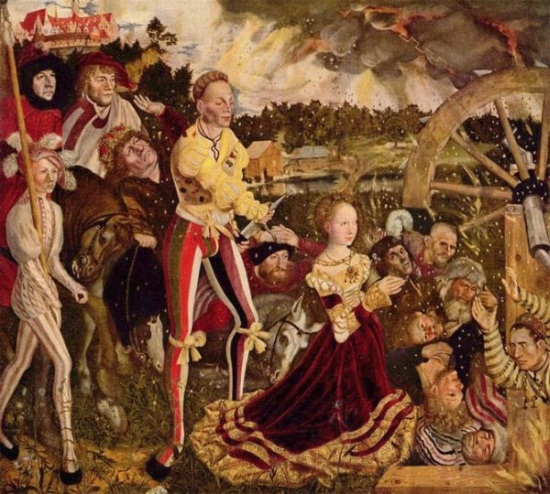
(Roman Christian Civilized Primate Religious Authority)Leo I, Bishop of Roma
Diplomacy: The deaths of Germain, Bishop of Auxerre, and Irenaeus did not help to bring the Church out from its depths of self-pity and ennui.
Suevi Kingdom
(Arian Christian Barbarian Component Nation)King Hermeric
Diplomacy:
Three babies were born to Hermeric and his new bride Aqua, hailed as a Sign From God that their alliance was a good one (see Holy Empire of Rome).
Western Roman Empire 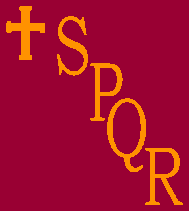
(Roman Christian Civilized Open Empire)Marcus Traianus Marcellinus, Augustus
Marcellinus, Flavius Diplomacy: Alpes Cottiae (P), Tuscia (P), Latium (P)
A purge of the Roman military lead to several early retirements in the upper ranks as Marcus sought to reinvigorate his empire. Some officers had confessions tortured out of them, a few alae were decimated, and generally the Fear of God was put into the troops. The emperor would have no slacking off during the coming campaign.
For Marcus Traianus Marcellinus, Augustus, had seen the sloth of the Huns despite their power, noted the dissipation of the other barbarians, and knew the time for a strategic riposte was now.
The Gothic War
- 445, April
-
King Ardaric was in something of a panic. A rider had told him that a large Roman
army was making its way out of Dertona heading south to Genua. This was not good.
His court argued energetically over the proper course. Clearly the Gepid army was
not up to the task of holding back the imperials. This left two options under
debate: surrender to the Romans, who appeared to be on their way into Ostrogothic
territory, or alliance with their fellow non-Latins. The appearance of an
emissary from the Ostrogoths tipped the balance and Ardaric agreed to request
their help. By the time the Roman army under Titius, p.p. Italiae, was
within sight of Genua the Ostrogothic host lead by Marcus Attilus had joined up with
the Gepids.
Titius quickly dispatched 800 equites under the old soldier Caracalla to cut off the Ostrogoths from communications with their lands down the coast. Meanwhile Ardaric and Marcus were attempting to sort out commands as the imperial army deployed opposite them across a small slough. Scores of ballistae and other assorted portable engines were lined up along the slope and began shooting into the barbarians, to little effect. As the barbarian host began to move hesitantly forward Titius sent a rider to the far left.
From an orchard near the city walls erupted a small but fast group of mixed troops, armed with spears, axes, and swords, under the command of the famous mercenary Eric the Burgundian, now a dux. At the same time the imperial clibanarii trotted their armored horses across the slough and the shallow brook at its bottom and into the Ostrogothic lancers. Beset to front and flank, the mixed Gothic army broke and fled the field down the coast - and into Caracalla's equites, who harried them all the way into Tuscia. Roman losses were 2000, while the Gepids and Ostrogoths sufferred 4600 casualties, almost none from Caracalla due to Gothic cavalry screens.
- 445, July
- A small auxilia garrison was left in Alpes Cottiae as Titius cautiously followed the Goths down the coast.
- 445, August to 446, March
-
This time Marcus decided to avoid a major battle and instead try to wear down the
Romans in a series of small sieges and skirmishes in the autumn of 445. This was
nearly successful, as Titius saw his men ambushed and outfought repeatedly while
taking and clearing fortified villages and manor houses. Despite ferocious losses,
however, the imperial advantage in mobile engines meant that at least the beleaguering
of walled places went more quickly than the barbarians could have anticipated.
After a mild winter it was clear in early March that Titius was not about to march away, though Eric had been given a small command which did much of the hard work - and took many of the casualties.
- 446, April
- The Allies decide to draw the imperial army even further into enemy territory and fall back into Latium, the Ostrogothic homeland.
- 446, June
- Eric the Burgundian crosses the Apennines with a small light force intent on raiding the Taifali lands, as these barbarians have joined with the Ostrogoths. He is however opposed by King Gregorius and his large and well-equipped army. In a series of scattered combats between small groups on either side Eric is slain and Gregorius is captured. Thus the raiding force is left leaderless, yet not without a leader - an enemy as prisoner, that is. Guntrim, Eric's second, meets within the week with Amalasigrun, the Ostrogothic queen who that very moon had been betrothed to the Taifali king. The majority of Eric's men are of barbarian background and have no particular quarrel with Goths generally. They listen eagerly to what the beautiful queen has to say, and after a bit of negotiation between Amalasigrun and Guntrim several donkeys laden with bags of coin are walked into the "Roman" camp while Gregorius is returned to his bride-to-be. Thus was literally paid a king's ransom in this case. A week later the pair are wed in Ravenna, thus joining the two crowns.
- 446, July
-
The imperial army under Titius suddenly appeared across the Tiber from Roma on
14 July, having slipped past or destroyed various enemy patrols. Ardaric and
Marcus Attilus were not ready for this and before they are ready to react find
their position untenable. The Allies fight and retreat out of Latium, alternately falling
back and ambushing their pursuers, a process of weeks which causes massive casualties
to both sides. Worse, in one action the Gepid king Ardaric is taken prisoner by
the Romans.
And yet it is the Goths who fall back, continually outmaneouvered by the brilliant Titius. Marcus grudgingly realizes he is outmatched and tries to preserve the remains of his army by retiring yet again, this time into Campania. News of the marriage of Amalasigrun and Gregorius is cheered by the Gepid and Ostrogothic warriors, each hoping the Taifali will overcome their resentment of other Goths yet more and come to their aid. For the Ostrogothic main army has now lost one in three men in campaigns against the Roman army, and the Gepids are leaderless and homeless, though they did at least refuse to surrender to Titius and remain encamped with their Gothic brethren.
- 446, August
-
Titius waved to the crowd lining the Via Triumphalis. The senate bowed to
popular sentiment, which was elated at seeing the barbarians driven from outside the
city, and awarded him a triumph. He refused the red paint as a pagan affectation,
but accepted the honor usually awarded to emperors only, understanding the depth of
gratitude the citizenry felt at the departure of Ostrogothic tax agents outside the
walls. It was bad enough to bribe the imperial officials, but commerce and the city
had not fared well in the decades barbarians had also exacted tolls on trade.
A Gothic captive preceded the chariot bearing the hero, chanting "Memento mori" continuously. This triumph terminated on the Esquiline Hill at the Basilica Liberiana, and included the entire army, which was served at a eucharist held on the plaza. Titius made a short speech, praising his master the emperor for the wisdom in choosing the proper hour to strike. He also announced that a large garrison would be left in the city, over 12,000 men and their supplies. This was cheered by his troops and the attendant citizens, thousands of whom eagerly quartered troops in their homes.
Over the next two years peace and prosperity was the rule, while those Ostrogoths farming in the country were allowed to remain. These last were anxious to learn their fate from the emperor, and most made plans to escape across the mountains, by sea, or down the shore just in case.
Ostrogothic Kingdom
(Roman Christian Barbarian Open Empire)Amalasigrun "the Fair," Queen
Diplomacy: Taifali Tribes (F), Apulia (P), Lucania (F)
The messenger bowed and left, holding the scroll Amalasigrun had just finished asking for peace with the Romans. The queen hoped to open negotiations, despite the bellicose policy her nobles insisted on pursuing. But she failed, and war came to the Ostrogoths (see Western Roman Empire).
She travelled to Ravenna on what, for her, was a mission as terrifying as combat - a diplomatic task likely ending in her marriage. Amalasigrun, though literate and wise, was still a woman hoping for a bit of happiness. Over the next few years she found that discussions with Gregorius of the Taifali reassured them both, and their marriage was surprisingly happy, given how political unions usually ended.
While the Ostrogoths and Taifali were busy making accomodation, an army under Blacwin was taking accomodations by marching thousands of colonists into Lucania and taking land from the locals for them. By April of 447 the former Roman province had been turned into a Gothic region. Blacwin did have news of the campaigns of Marcus Attilus (see Western Roman Empire) but knew that his small force would not make any difference in that titanic struggle.
Instead he moved his army into Apulia where a hard fought campaign through the winter of 447-448 lead to success. At last he felt able to reinforce Marcus, and force marched across the mountains into Campania in the summer of 448. The united Ostrogothic army encamped there, wondering how the struggle against the forces of imperialism would end. All looked to the Taifali for hope, though many still felt a sense of disgust at relying on the least of all the Goths for aid.
Slavic Kingdom of Aemilia
(Slavic Pagan Barbarian Open Empire)King Kroll
Diplomacy:
Mundzuc left, taking his thousands of Hun warriors with him. With no prospect for pillage or plunder, they trotted away. Kroll listened closely to tales from itinerate merchants and others for news, hoping his small realm would escape the notice of Mediolanum.
Holy Empire of Rome
(Roman Christian Civilized Open Empire)Probus, Augustus
Diplomacy: Savia (FA), Pannonia I (EA), Carnuntum (EA), Suevi Kingdom (NT)
The death of Cerelia, daughter of Stilicho, seemed to catalyze a change at court. Attendance at church went up, discussions became more earnest, and a smell of change was in the air. Looking at the now-permanent Suevi guardposts had become unbearable, and a delegation was appointed to discuss an arrangement with the enemy of long years.
Probus himself rode out to talk with the barbarians, along with Bishop Commodus and others. King Hermeric was surprisingly receptive, and literate, and the two leaders quickly learned to respect each other. In time, Hermeric agreed to give the daughter of king Korga, Horta, a widowed beauty, in marriage to Probus. There was of course the small issue of Probus' current marriage to Aqua, the other daughter of Stilicho and known for her wisdom and tart conversation. Fortunately for the Augustus Bishop Commodus was on hand to annul the bond based on the failure of Aqua to deliver to the realm a child by her husband.
With the agreement of Probus his now ex-wife was given in marriage to Hermeric, to increase the bond between the peoples. He soon came to regard this charitable move with chagrin as Hermeric and Aqua produced many children, quickly. Finally, in 448, Horta gave birth to a son, and all the Holy Empire of Rome rejoiced.
Meanwhile, other officials were sent out to regroup the empire, and Savia, Pannonia I, and Carnuntum saw benefit in ties to the HER.
Dalmatia - Civitate Foederatae
(Roman Christian Civilized Component Nation)Petronius, rex
Diplomacy: Moesia I (A), Dacia (T)
Taking advantage of the fear induced by the irruption of barbarians into the Balkans (see Oghuz Turk Realm) Petronius sent emissaries out to the hinterland. The Dux of Moesia I wed the flavia Amaryllis at the instigation of Eutychius, and Dacia welcomed him as well.
The Pirate Kingdom of Illyria
(Orthodox Christian Civilized Open Empire)Tirvalda Illyria Leisima
Diplomacy: Histria (F), Pannonia II (A)
Tirvalda wanted to invigorate her court, and knew that the Charybdis of the realm was her own crown prince Lisian. Thus was he removed as heir. The prince did not seem to mind, and continued to spend most of his time hunting and swimming and avoiding anything resembling work. His brother Lirian was named the heir, and all was well until the next month it was revealed that he had sired a son by a launderess' daughter.
Lirian was given a small fleet and told off to Alexandria. His job was to support the empire by blockading the port. His mixed fleet of biremes and other vessels proved unequal to the task of stopping trade through one of the busiest ports in the world. On the plus side, he was able to sample some good wine in Pelusium, his base port.
Lemaldis and Tirvalda made their way to Roma. There they met with Hecate and many of the priests of the old religion. While many were scandalized, the discussions went well. The defeat of the Ostrogoths and the entry of the Roman army into the old capital caused some concern, but so far the Illyrians have been left to themselves.
Taifali Tribes - Friends of the Ostrogoths
(European Pagan Barbarian Component Nation)King Gregorius, Rex Taifalorum, Vicarius Belgicae
Diplomacy:
Seeing the writing on the wall, Gregorius armed more of his warriors. A concubine died in childbirth, which was just as well (see Ostrogothic Kingdom), really. Rufinia, Gregorius' teen sister, was feeling ignored and misunderstood. She spent time with a visiting Roman poet and left with him after she bore the man a daughter. Her twin, Livia, was despondent at being left behind to clean up the social wreckage her sister had made.
The court urged Gregorius to find someone, preferably a wife, to bring his household to heel. And this he did. As to who would bring the Romans to heel, none would venture a guess (see Western Roman Empire) but all knew that an alliance with the Ostrogoths was essential.
Kingdom of the Red Huns
(Roman Christian Nomadic Open Empire)Modares, khan
Diplomacy:
Before the morning bells rang at the monastery, a great shaking hit the city of Burdigala on 14 October of 446. Hundreds of families streamed out into the dim streets as walls and roofs collapsed around them. By noon it was clear that help was needed, and Modares sent in teams to help move bodies out beyond the now-destroyed city walls.
Gepids
(European Pagan Barbarian Open Empire)Ardaric, king
Diplomacy:
Ardaric started the year 445 in his palace looking over the sea, and ended the year 448 in the basement of a manor house outside Ostia, tied to the wall. Sic transit gloria mundi (see Western Roman Empire).
North Africa
Berber Kingdom of Tingitania
(Roman Christian Civilized Open Empire)Flavius Juba, Rex Tingitaniae
Diplomacy: Zirid (FA), Maghrib (EA), Rusaddir (EA), Merrakesh (PT)
Despite his fearsome reputation and advanced age, Juba knew that he was not immortal. Thus it was that he named his son Scipio as his heir. And there was happiness among the people. Scipio was then wedded to a princess from Rusaddir, and there was yet more happiness among the people. Juba and Scipio then invaded Merrakesh at the head of an army bolstered with thousands of young men armed with bows, slings, and javelins. Victory was swift, a triumphal arch was erected in Tingis, and there was nigh-unbearable happiness among the people. Maximinus and Gordius toured the old lands and convinced many to augment the kingdom, to return to their old master. And there was melancholy among the people, for they had a hangover.
Donatist Christian Church
(Donatist Christian Church Civilized Primate Religious Authority)Archbishop Maximianus
Diplomacy:
The death of both Maximianus and his heir-apparent Judas on November 30 of 448 threw the Church into confusion. They died on the streets of Leptis Magna when a brick wall collapsed next to them as they walked to a meeting. A conclave was held within a week, but nobody could lead the priests and bishops in a constructive direction, so discussion foundered.
Eastern Europe
Arian Christian Church
(Arian Christian Civilized Primate Religious Authority)Cincinnatus, Pontifex ipseque Primas Gothicus et Germanicus
Diplomacy:
The Church was paralyzed over whom to pick as the new Pontifex. So the gathered bishops ate well.
Khanate of the Tyrasean Alans 
(European Pagan Nomadic Component Nation)Arpad, Khan
Diplomacy:
The arguments of the Oghuz were most convincing, so Arpad lead his people south into imperial lands. Mind you he despised all Dead God worshippers alike as fools, but if the Turks had a motivation he would did not mind riding that particular powerful horse to glory and loot (see Oghuz Turk Realm). The deal was sealed by the marriage of the very young Api, daughter of Respendial, to Bogotai the Turk. The tribes thus found themselves in Thracia in 448.
Orthodox Christian Church
(Orthodox Christian Civilized Primate Religious Authority)Patriarch Dioskoros
Diplomacy: Macedon (MN), Attica (CH), Thessaly (AB), Europa (UN)
The masses of illegal immigrants crossing the Danube caused consternation in the Church because of their Monophysite faith. Not only did these barbarians lack proper documentation, but they were heretics as well. Clearly this was not to be borne.
This was the main topic of gossip at the conclave, but they also decided on Dioskoros as the new Patriarch. He is elderly, very competent, and was seen as a transitional figure. The new Patriarch agreed to continue to push the new calendar, which holds a Biblical quote for each day, as he said, "a daily reminder of the Bible, if you will."
Anianos, preaching in his home diocese of Ephesus, actually repelled over a hundred families from the Church with his tone-depth ministry. On the other hand, John patriarch of Antioch managed to increase his congregations. The provinces of Lydia, Isauria, Phoenicia, and Syria saw successful evangelism efforts. And of course all mourned the death of the Bishop of Athenai in January of 535, but not so much as the concern over raids into Europa aimed at Church holdings. This did not seem a good sign for the future of the European faithful.
Eastern Roman Empire 
(Orthodox Christian Civilized Open Empire)Theodosius II, Imperator
Diplomacy: Kyrene (UN), Coele Syria (EA), Egypt (T), Moesia I (UN), Moesia II (UN)
"I must have the Nile!" roared Theodosius. His geographers, generals, and other aids recoiled to varying degrees from this uncharacteristic outburst during their weekly meeting. The Imperator had spent what seemed a lifetime in Pelusium, sending and receiving units, arranging for supplies, and engaged in the tedium of campaigning. But once again he would march down the coastline to retake Egypt for the empire, and his legacy.
- 446, April
- After mustering and marching for months, the armies of Galerius Fabius and Zenon, Proconsul of Faiyum, trod on the soil of the province of Egypt proper. The local garrison was vastly outnumbered, outclassed, and outmaneouvered, despite a vigorous defense by the Arab commander ibn Aasi. Zenon had left his infantry in Berenice to speed his march, giving the Romans an uncommon cavalry superiority.
- 446, May
- Hearing this news, Peranius, Alexandrian Militia Autarch, decided that it would be militarily unwise to take on the Imperial army in Egypt. Thus the province was allowed to become a tributary of the empire, officially hailed as liberated but no longer all that keen on Imperial policies. In addition to the Monophysite army defending Alexandria, the port citadel, Pharos Fortress, was also a strong power to consider, held by the Lakhmids. So as long as the fort was in Arab hands the Egyptians would not fully consider Imperial rule, and Arab sympathizers operated in the villages. Thus Peranius was reassured that eventually the empire would be forced to leave.
- 446, June
-
The Imperator had high hopes. Once again his army was large, and this time a strategic
flanking move had inserted a large imperial army in the enemy rear, the province of
Egypt. With nowhere to run, all the excellent general Marius Furius need to was dislodge a
bunch of nomads. Bishop Xenon assured the assembled that God was indeed on their side,
though Theodosius knew how slippery his Lord could be. One tribune kept complaining that
supplies were going to be hard to come by because Palaestina Salutaris was an untamed
region plagued by roving bands of Arabs exacting tolls at random and raiding supply
columns for the sheer joy of it. But Theodosius refused to be bothered by such minutiae
and instead worked on a redesign of the equites sagitarii unit standards.
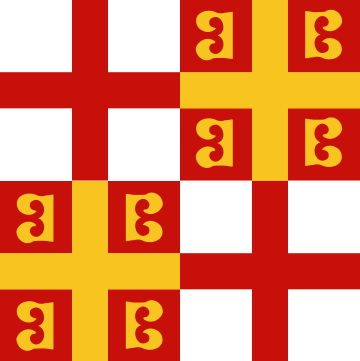
For it was now too late to be worrying about logistics, as the army was sitting outside the walls of Thmuis, a small city boasting a surprisingly sophisticated set of defensive works, including glacis, forward bastions, counterscarps, and so on. Clearly the Alexandrians had been helping these Arabs, thought the imperator. He was indeed correct, and the following day the Alexandrian militia under Peranius had deployed across the Ostium Mendesium from the city. Across its waters he could see the tower of the cathedral where he had deployed men with flags to signal the Roman's movements.
Later in the day the Lakhmid army began to arrive near Thmuis and set up camp near the Alexandrians along the low dike which bordered the river and provided that most important thing in the Delta - dry land with fewer insects. Peranius and Masud agreed that again sucking the Romans deep into their territory was a good way to ground them down before delivering the final blow, a battle.
And indeed the weeks of marching through mosquito-infested marsh and farmland had sapped the invaders' strength. The heat, disease, and poor food wreaked havoc on man and beast, and most even welcomed the chance at battle as a way out - one way or another. Marius Furius had managed to learn from a peasant about a ford a dozen stadia upstream from his camp. He ordered some scolae to cross there that very night and establish a beachhead. This they did, quietly, and apparently unnoticed by the Arabs encamped nearby. The next morning engineers were busy driving pilings into the soft bottom of the river for a quick bridge.
Meanwhile, Husam al Din had been watching the Romans at work, smiling. The same night that the beachhead had been made Peranius had moved his entire army into Thmuis itself and managed to conceal them there. Suddenly Husam had the rueful thought that a Roman officer might have been watching the Alexandrians redeploy, smiling. Ah well, he thought, and laughed, causing his officers to glance at each other. He muttered, "Then we shall see, eh?"
The morning of June 29 was bright and cloudless and hot. Nothing new there, thought Marius Furius, and he ordered an assault of Thmuis. The Roman general considered taking the city a precursor to his next move, attacking from the beachhead. Thousands of men advanced on the walls while engines launched spears and pieces of ancient stone - the only rocks available in the alluvial plain - into Thmuis. When the legionaries had advanced to with two stadia of the nearest bastion they were suddenly hit with a volley of spears and stones shot from supporting fortifications. Holes opened in the ranks, and with a roar the Romans, sweating in their armor and sandals and legs caked in mud, charged across the glacis.
As the legionaries tried to take the bastions Masud ordered an assault on the Roman bridgehead, which now hosted some thousands of horse and foot. Surprised, the invaders fought as best they could, but they could not be reinforced quickly enough and were overwhelmed, suffering incredible casualties. Haythim ibn Mudin then lead 2,000 light and fast mercenaries across the bridge and after the Roman flank.
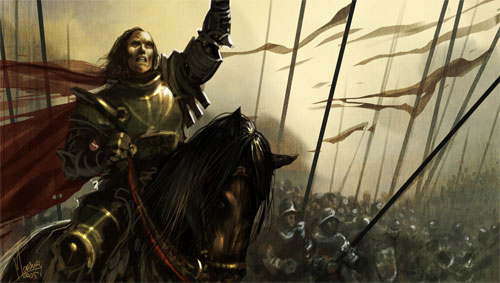
Peranius had the signal from Masud that the operation was a success and ordered his men forward. They surged out of hidden portals, deployed quickly, and attacked the Romans. The Alexandrians were happy at the chance to prove that Monophysite legionaries were better than their officially Orthodox counterparts. Shocked by the counterassault the legion fell back. This sent a wave of fear through the Roman army, and Marius Furius knew the battle was over. Equites were sent out to cover a retreat.
Two days later Theodosius was counting his losses. The scolae and skirmishers had suffered 30% losses, the rest of the army 20%, and the army was like a horse ridden too long in the sun - it was blown. Once again Theodosius had to organize a retreat back to Pelusium. His mood was not one to match the sunny weather. The fact that the Monophysites had lost fewer than 4000 in the Battle of Thmuis did nothing to improve it. At least he could point to the success of Zenon and Galerius Fabius when writing home.
- 446, July
-
The Romans having secured the countryside of the province of Egypt, a blockade
of Alexandria was established. While this
was a success by land, the sea effort by allies (see The Pirate Kingdom of Illyria)
was an utter failure. Commerce continued to reign supreme along the waterfront, and after a
while the pirates were regarded as just another feature of the harbor.
Meanwhile, Bishop Xenon with the imperial army heading for Pelusium instead hired a fast ship and sailed home to Constantinople. His ostensible reason was to report to the Patriarch, but in reality he was disgusted with the war and wanted no more of it.
- 447, July
- Disgusted, Galerius Fabius and Zenon lift the blockade of the great city of Alexandria. They did however remain in the Egypt.
Various domestic efforts met with diverse fates. Athenai grew and prospered, and works were begun throughout Greece. The invasion of the Turks (see Oghuz Turk Realm) and allies threatened to undue these good works, and messages to Constantinople from Titus Pollo were read carefully by officials. Moesia, which had tolerated Titus's troops, were forced to abandon any imperial entanglements.
Funding of priests in Coele Syria, Syria, and especially Psidia proved counterproductive, as in each case the new clerics moved into lavish housing, ate well, and caroused publicly. This offended many in each case. The revelation that the flavius Livicius Aurelius had sired a boy by the daughter of a royal pottery master did not help the impression of lax morals in the empire. Opposing this was the highly-regarded Pius Crassus, who spent years in Coele Syria, a hotbed of missionary activity. He got them to pay more in taxes status, but no more due to religious issues.
Finally, two astonishing acts were the abandonment of Kyrene, a city established by Greeks a thousand centuries earlier, and the opening of trade with the Illyrians, who seemingly flout everything for which the empire stands. Many rumors were spread that these acts would come back to bite the Imperator in the future.
Middle East
Ghassanid Arab Kingdom
(Monophysite Christian Barbarian Open Empire)King Timotheus
Diplomacy:
The king was surprised to learn he had to approve of a marriage between his daughter Mary and a prominent local tribesman. Shortly thereafter a remarkable little girl was born to the couple.
Kingdom of Yemen
(Judaism Civilized Open Empire)King Ishmael ibn Yahsub
Diplomacy:
Ishmael named a prince to be his heir, and the aged king spent a lot of time chatting with merchants and ships' captains. Bulging granaries were kept against the lean years. There was a plethora of rumors about princes and princesses and their adventures, but no evidence was ever provided. For this Ishmael was thankful.
Lakhmid Arab Kingdom
(Monophysite Christian Barbarian Open Empire)Sheikh Masud al-Qays, Satrap of Egypt
Diplomacy:
The death of prince Imran al-Qays from a fever in 445 was a shock to all, as he was a healthy 24-year-old who had just been named a royal prince. Another unpleasant surprise was a bad storm season on the Red Sea, and one in particular sank the Lakhmid convoy to Axum, wiping out trade between these two nations. More bad news was the death of Masud's sister Ghayda in childbirth, though the very large baby girl did survive. The child grew quickly into an aggressive, strong, and rather unappealing creature. His other sister, Sudi, married a Greek grain merchant from Alexandria, which match got mixed reviews at court.
But of course the real news was the expected Roman assault on Augustamnica (see Eastern Roman Empire). The Sheikh himself readied the defenses yet again, and ordered Peranius of Alexandria to campaign in Faiyum. Peranius refused, as he was outraged at being ordered to leave his post on some ancillary mission of dubious value. And, secretly, he knew that Alexandria would be under threat and did not want to harry off under the circumstances. He had his sources.
Another "subtle" bit of news came out of the court of Masud al-Qays was his surviving an assassination attempt. The royal guard managed to nab the would-be killers before they got close to the sheikh, finding daggers hidden in a bowl of rice about to be served in the royal tent. Put to the question, the three men confessed to having been hired by an Orthodox priest in Berenice to kidnap Masud.
While the imperator himself may have been defeated (see Eastern Roman Empire), the loss of Egypt was a blow to the Arabs, and Masud considered well his strategy.
Monophysite Christian Church
(Monophysite Christian Civilized Primate Religious Authority)Patriarch John
Diplomacy: Artaxata (CH), Van (CH), Berenice (MN), Myos Hormuz (MN), Arcadia (CH), Aswan (CH), Libya Inferior (CH), Maghrib (CH), Beja (CH), Sennar (CH), Dongola (CH)
Yet more of the faithful were trained and armed for the defense of the Church, and none too soon (see Eastern Roman Empire). Their commander, Ethiopus, went to meet the Lord and was replaced. Missionaries to Berbera and Opane met with substantial success. Trophius, Bishop of Antioch, was dispatched to Donatist lands and founded a church in Maghrib. A sudden storm in the Ionian Sea on his return trip claimed his ship, and he was hailed as a martyr and canonized within the year. Bishop Alan journeyed to the distant Nile city of Dongola and founded a small congregation there. Elsewhere the Church grew widely.
In every place the faithful gathered there was anger and prayer over the persecution of Monophysites in Persia by the Zoroastrians (see Orthodox Zoroastrian Church). There was outrage aplently, given the the Persians were long thought to be fellow-travellers in opposition to the "snakehead" in Constantinople. In Alexandria emotions ran high because of the imperial troops encamped outside the city, and on 18 August 447 the Zoroastrian quarter was attacked by hundreds of youths as the militia watched. Fires rose to the sky before the Church troops marched in to restore order and put out flames. The residents were either killed or driven out by angry mobs, despite the efforts of a couple of priests to hold them back. Patriarch John himself demanded an explanation (see Orthodox Zoroastrian Church).
West Africa
Moorish Kingdom 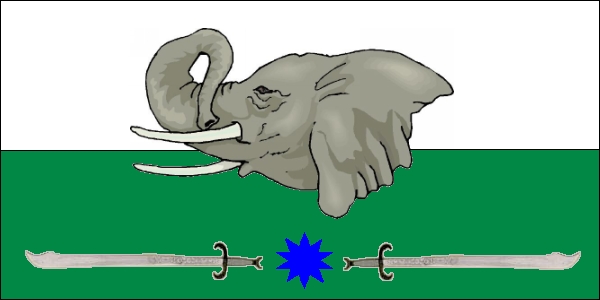
(African Pagan Barbarian Open Empire)Sheik Izri al-Kasurga
Diplomacy: Kanuri (PT), Daza (PT)
Attempts to woo Gao yielded some small progress but the locals remained Sudanese loyalists, mostly. Maysar spent much time training several thousand javelinmen into a more disciplined fighting force, using long hikes, practice assaults, and competitions.
As usual, the Moors moved against their neighbors. Prince Severus and Captain Azerwal moved against the wealthy land of Kanem-Bornu. But first, their army needed to get there. The Hausa were cowed by the reputation of the Moors and were happy to sell supplies to Severus and lend guides - and happier still to see them leave. The Kanuri were not impressed and mustered his warriors to resist the foreigners. They were wiped out, their king slain, their royal city burned.
Thus did they arrive in Kanem-Bornu. The Moors were isolated and far from home, but nonetheless campaigned vigorously against fierce resistance. Months of fighting eventually lead to the capture of the king of the Kanem-Bornu. The local warriors declared a unilateral truce, but Severus was unimpressed. He ordered the king to be executed. This proved to be a foolish act, as the people rose up in anger against the invaders and possessed the numbers and spirit to restore the local army to viability under a new king, Karanga (see Kingdom of Kanem-Bornu). Against such opposition the Moors were forced to retire, withdrawing with 15,000 slaves. Thus Severus and Azerwal were stuck in Daza, awaiting further orders, and none too happy.
A son was born to Izri, causing much joy at court. An heir would help to calm the people, still nervous about political unrest of some years past.
Kingdom of Kanem-Bornu
(African Pagan Barbarian Open Empire)King Karanga
Diplomacy: Kanem-Bornu (HM), Soro (FA), Sokoro (EA)
The brother and heir of the slain king vowed vengeance on the Moors. Karanga quickly made the round of bordering peoples, and some agreed that the foreigners would need to be faced lest they all be enslaved. While the homeland had been ravaged, the people were still willing to fight and build fortifications. Karanga and his beautiful young wife produced a daughter, taken as a promising omen.
East Africa
Axumite Empire
(Monophysite Christian Civilized Open Empire)Emperor Iannos bin Tewodros
Diplomacy:
The long-ailing Tewodros "One-Eyed" Ella Asgad, Emperor of Axum, breathed his last on 24 February 446. A wise ruler, he had prepared well for his own demise and Iannos succeeded him with celebrations not riots. He was laid to rest in a small pyramid each side of which bore a Christian symbol - cross, fish, etc. The novel entombment was his own design, so despite the novelty Iannos had no choice but to honor it. More mourning was in store, for in 448 Elizabeth, the Blemmye princess and political favorite, died at the age of 47. Despite her role in the war with Nobades she was much beloved and many tears fell at her memorium.
Blemmye Tribes
(Monophysite Christian Barbarian Component Nation)Zakarias II, King of Blemmye
Diplomacy:
The young king gave up any imperial ambitions and became yet more close to the Nobades court.
Nobades Kingdom
(Monophysite Christian Civilized Open Empire)King Phillipus Silko, Basileus
Crown Prince Menas Silko
Diplomacy: Thebais (PT), Blemmye (A)
First, the king was relieved the Romans chose not to attack his nation. Thus he ordered an invasion across the Nile into Thebais, where the local comitatenses were surprised and routed. Second, Menas chatted up Zakarias II and convinced him to become a full ally of Phillipus. Another success.
Elsewhere, fate was messy. Tabiry, wife of Ptolemy of Berenice and daughter of Menas and Yoanna, died in childbirth at the age of 25. The child did not survive. Ptolemy, overcome with grief, fled the court with his surviving child Baruch and went home. Meanwhile Shenouda attempted to slip into the camp of Zenon of Faiyum and convince him, "Better a big fish in the Nobades pond than a Roman afterthought." The proconsul agreed to meet the Nobades emissary late one evening. But at the church where they were to talk Shenouda instead met an imposter and many large Faiyumite legionaries. The Nobatean was captured in a struggle, his hand broken, and the man carried away.
Shenouda waited in a monastic cell for months, until his hand was tolerably healed, then he gave the monks the slip and escaped on a camel. Fleeing up the Nile he rejoined Phillipus in Thebais and told his tale. The king rewarded his man with gifts and titles, and pondered his next move.
Persia
Orthodox Zoroastrian Church 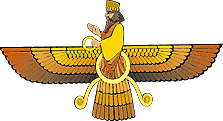
(Orthodox Zoroastrian Civilized Primate Religious Authority)Azareth, Mobedhanmobed
Diplomacy: Dura (OZ), Khurasan (CH), Coele Syria (CH), Artaxata (CH), Abarshahr (CH)
The new mobedhanmobed was a blur of ecclesiastical activity. New agiaries were established in Artaxata and Abarshahr, and membership grew in Dura, Kash, and Media. The people of Kash, at least, were happy for the attention, given the warfare in their area (see Kushan Empire), though they were already followers of the teachings of the gathas. In the west, Azareal entered Roman lands to found a Zoroastrian presence in Coele Syria. This was quite controversial, for reasons given below.
In Mesopotamia and Mosul several Monophysite churches were set ablaze under odd circumstances. The first one went up on March 3 of 445 and while people were saddened nobody thought much of it until another fire claimed a church in Mosul on March 17. Over the next three months 38 churches were destroyed, and the Christian community was frantic. At each was left a burned clay tablet inscribed "Sons of Judah." Naturally tensions between Christians and Jews rose under these circumstances, and when synagogues and Manichean houses started burning tensions were boosted yet further.
But on the evening of June 10 five men were seen entering a church in Mosul. The Monophysites in the neighborhood had set up an armed watch, and scores of enraged young men flooded the church within minutes. The men were caught with pitch, rags, and other tools of the arsonist, and were beaten severely. Two survived and were spirited away to a safehouse where they were questioned "closely." One admitted that officers of the gyanavspar, the Persian holy warriors, had recruited them. Thus was the hand of the Zoroastrian establishment shown in these evil acts.
Rumor and gossip built on this evidence and Jews and Christians rioted in Mosul and the Mesopotamian hinterland. The shahanshah left the matter to Azareth, who sent his religious troops under Tewfik, an Arab dastur, and Bhikaji into the cities of Mesopotamia where Christians, Manicheans, and Jews were systematically killed, raped, and burned out - to restore order. Thousands of refugees fled on hearing stories of horror that were only slight embellishments on fact. Some local Zoroastrians hid their neighbors, more complained to their dihqans and other officials, but most looked the other way. The people of Mosul wondered whether they would be next, though only a few violent incidents took place between communities.
By 448 the ghost city of Hira had been reborn with refugees from Persian oppression filling empty housing, repairing walls, and organizing a communal council and governance. Almost the first activity was rebuilding the civic defenses and arming the population. Lead by a rabbi named Samuel, the crowds of Manicheans, Jews, and Monophysite Christians chanted, "Never again!" The farmland around the city filled with more refugees, who also harbored lasted hatred towards the Zoroastrians (see Sasanian Persian Empire).
Kingdom of Armenia
(Monophysite Christian Barbarian Open Empire)King Tigranes II
Diplomacy:
Queen Varhia gave the kingdom another son, but then died tragically in a riding accident on July 30 of 445.
Kingdom of Persarmenia - Sasanian Persian Satrapy
(Monophysite Christian Barbarian Open Empire)King Zoltan the Patient, Satrap of Armenia
Diplomacy:
As if competing, a son was born of Zoltan as well.
Sasanian Persian Empire 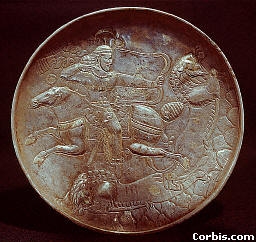
(Orthodox Zoroastrian Civilized Open Empire)Darius, Shahanshah of Persia
Diplomacy: Ublra (F), Herat (EA), Balasagan (F), Sawad (AW), Hira (AW)
While officially at peace, Darius could not help feeling a sense of contentment on hearing the news from the Nile (see Eastern Roman Empire) and the Romans. The newly-married princes Xerxes and Mazdak travelled to distant Hazarajat, but events on the ground caused a change of plans (see Kushan Empire) so the pair pestered Herat until the Buddhist locals decided the empire might provide some security in these troubled times. Similarly, Ephialtes lured Balasagan into the imperial web. Of course, the shahanshah was frustrated he had been unable to get to Kash in time to "save" it. But the winning of Ublra by the smooth words of Megabazus did palliate his mood.
The captain of the guard opened the gates of Merv to the ehran-spahbad Ariobarzanes and his men. Rather, to what was left of the army which had set out against the Kushans many years earlier (see Kushan Empire). Now reduced to only 2800 the citizens of the city were still wary of them and avoided their calculating glances. Ariobarzanes presented a letter from the Kushan "Empress" Lakshmi detailing the terms of their parole, to which he and his men had agreed. The gist of the scroll was that they should fight no more against the Kushans, in exchange for which they were set free.
While his men were free, imperial officials in Merv took custody of Ariobarzanes and packed him off to Ctesiphon. The general gave no resistance, and so was treated gently and brought before Darius in good condition. Ariobarzanes pleaded for leniency from the shahanshah, but the face of the most powerful man in the world showed no emotion. The man was taken away to imprisonment in a tower of Dezbar castle in Ahvaz, but was not stripped of his titles and had an entire floor to himself.
The winning of many Parishkhwarger's Turks over to Zoroastrianism was seen as a triumph over the forces of darkness from Turan. The managing of religious matters by the mobedhanmobed left Darius aghast, especially when flames were visible from the palace late in the night (see Orthodox Zoroastrian Church). The empire did not need more enemies, even if they might be tools of Ahriman the Destroyer.
Visigothic Kingdom 
(Orthodox Christian Civilized Open Empire)Athaulf, Rex Gothicus
Diplomacy: Arabia (UN), Petra (UN)
In his old age, a son was born to Athaulf, and all were amazed. His daughter, Sofia, was "quickly" married to a young man and gave birth to a son. All of these were taken as signs the Providence smiled upon the Visigoths. But there was yet the nagging problem of cash. Towit, the kingdom had too little of it for the taste of most of the younger warriors.
Thus it was that in July of 445 many leaders called for Athaulf to step down, or to invade someone, or extract gold from the Romans, Persians, or, well, anyone. Athaulf attempted to reason with them, and failed. Much of the army was in open revolt, but the king did not wish to act in a Roman manner, by decimating legions. Because these were his people. He had to live with them.
So he waited them out. And as he did so, the people of oppressed Arabia and the city of Petra watched. In September they decided to rise up, and threw out the Visigothic tax collectors. This left the mutinous warriors in even worse financial straights, and they decided to give up and pledge their loyalty to Athaulf once more. In exchange he promised to act soon to relieve their sufferring.
South Asia
Buddhist Stupas
(Buddhist Civilized Primate Religious Authority)Master Sanath
Diplomacy:
While he had enjoyed his time in China, a dream informed Vis'vadeva that he needed to return his master Sanath. Thus his little family trekked along the Silk Road. Somewhere between Ching Chueh/Niya and Khotan an adorable daughter was born to Asenath, who was an amazingly old 38, another miracle birth. By December of 448 they had found lodgings in Purusapura, where he taught in the city's central plaza to hundreds and then thousands, weather permitting. Money was never an issue wherever they went, for unknown friends would always appear with food, a place to live, transport, as needed. Several monks had taken to following him about and keeping chronicles of his life and work.
Lambakanna Sinhala - A Kingdom of Chera
(Buddhist Seafaring Component Nation)Chandra, Raja
Diplomacy:
The people enjoyed the pause in the generational struggle between Chera and Pandya in which they were trapped. An exceptionally charming daughter of Dipak was married in a well-attended ceremony, and much happiness flowed from this.
Chera Kingdom
(Hinduism Seafaring Open Empire)Veerpal, Rajadhiraja
Diplomacy:
A watch was kept on the frontier with Pallava. Given past history, Veerpal was naturally concerned. This worry was lifted on the birth of his daughter, who instantly lifted the mood at court with just a coo.
Pandya Kingdom
(Jainism Seafaring Open Empire)Jahala, Rajadhiraja
Diplomacy:
Scores of families encamped near the palace, asking for food. Crop failures and poverty had driven many farmers to wander in search of something to end their hunger, some few turning to banditry. The affairs of prince Gundag, Jahala's brother, caused much chattering, and among the lower castes were a cause for resentment.
Empire of the Guptas
(Hinduism Civilized Open Empire)Fatima, imperial regent Diplomacy: Gtsang (NT)
The Maharajadhiraja showed his ambition in many ways, beginning at home. The prince Samudra Gupta was named kumaramatya of the West and given Arjunayana and its environs as his domain, under Skanda. Another shakeup at court saw Bindusara and Ashoka named Princes of the Realm. Thus did the brother of Skanda lose position to the sons of Skanda, an event neither entirely surprising nor unexpected. Naturally Samudra was - or appeared to be - upset, but he was mollified with titles, wealth, and a new concubine.
Many cities grew in size under enlightened regulatory and tax policies, a road was built from Keldyna to Barisal, and the army grew yet mightier. Patiliputra was now larger than any city in China or Persia, but not so large as the biggest cities in Europe, Roma and Constantinople. An army beyond numbering lead by Bhagabadra and Bai Chunhui invaded and liberated Gandhara in the frozen north as a favor to the husband of the Kushan empress (see Kushan Empire), whose embassy was fulsome in panegyrics towards Skanda Gupta. No Hephthalite resistance was found, such was their terror of Indian power. Nonetheless Gtsang stopped sending tribute to Patiliputra on the death of its raja.
Escorted by Skanda's personal guru, Asvaghosa the Holy, the princes Ghatotkacha and Harishena journeyed to Pravarapura to wed the daughters of Divakarasena and Damodarasena. These were named Ajjhitabhattarika and young Madhuriborn, respectively, the former a dullard, latter born of a Nasik princess and a glorious if somewhat fickle creature. The wedding was quite an affair, and the pairs seemed reasonably happy given the political nature of the pairings. Ajjhitabhattarika gave birth to a girl, while her cousin had triplet daughters followed by a son. One of the latter set of girls was so enchanting that the handmaidens argued over who would tend to her, though of course they were all wonderful.
A fever swept the court in the summer of 448, claiming Ghatotkacha at 28, leaving Ajjhitabhattarika a young and even more irascible widow. But on July 13 the disease claimed Skanda Gupta, emperor of All India. It was as if heaven and earth shook, news of his demise at the age of 54 spreading like a grass fire. Immediately the followers of Samudra, Ashoka, and Bindusara organized behind their respective princes and lobbied among the various rajas and bureaucrats. Harishena also funded a party, further confusing the political situation.
After two moons of maneouvers, rumors, and governmental paralysis the princes' agents agreed to name a Regent, Fatima, the eldest of Skanda Gupta's daughters, not for any personal characteristic but because she had put her name forward via her husband. Thus was strife averted - or perhaps just delayed. Fatima had the advantage of being married, and thus respectable, yet childless so above suspicion on that account. She is a controversial figure who spends "too much time" with her yavana guard and was even seen training them in combat techniques - without her husband. That he had not, by her age of 39, been able to keep the princess in the house was a continual source of gossip.
Kingdom of Sindhu - Gupta Tributary
(Hinduism Civilized Component Nation)Abhayatta, Maharaja of Pattal and Sindhu
Diplomacy: Khrypore (F), Baluchistan (EA)
The mercenaries were told their services were no longer needed. They grumbled, but Abhayatta was developing a new African policy which did not involve sellswords. Instead, a peaceful expedition to Sarapion set forth. The diplomats had a very rough passage, their ship breaking a mast in a storm at one point and limping into the distant port thanks to the excellent seamanship of the crew. Despite all of their efforts the locals were not interested in closer ties due to their many differences with South Asian peoples generally. The diplomat then contracted a local fever and died, thus ending an ill-starred effort.
On a more positive and local note a city in Sind was given a new charter and grew explosively into a busy little port, called Khrypore.
Hinduism
(Hinduism Civilized Primate Religious Authority)The Guru With No Name
Diplomacy:
A collective satisfied yawn travelled from temple to temple.
Jain Sects
(Jainism Civilized Primate Religious Authority)Sarvanandi, Acharya
Diplomacy: Sarapion (AB), Chandela (MN)
The Svetambra sect was unhappy with the spending priorities of the acharya and grumbled notably. They threatened to leave the organization, and stopped attending some congresses. Aleray, in distant Sarapion, passed away at the age of 70 while working on a large abbey. The local people dedicated the completion to his memory, and finished the work ahead of schedule. A new hospital in Chandela catalyzed the conversion of thousands there, and in Avanti as well.
Kingdom of Nepal - Gupta Tributary
(Buddhist Barbarian Component Nation)Bhim Sen Licchavi, Rajadhiraja
Diplomacy: Dhera-Dun (A), Himachal (A)
Given the long absence of Vis'vadeva (see Buddhists) a new heir was named, Bhim Sen. This proved wise, as Biscotti died in July of 448 after a long a prosperous reign. His popular successor took power without opposition. Gyanendra and Girija were sent on missions to Dhera-Dun and Himachal, where they were well received. The consort of prince Kirti died in childbirth, but her baby, a boy, survived.
Pallava Kingdom
(Hinduism Seafaring Open Empire)Solavarman I, Rajadhiraja
Diplomacy: Malabar (UN)
The year 446 was a year of several changes. A girl was born to Solavarman, the crown prince, and his wife, a princess from Tagara. The trade fleet sent to Aceh was wiped out in a typhoon. And on September 3 Mahendravarma I died of a sudden heart seizure. This caused some turmoil, but only to the extent that the official seals needed to be reworked. Otherwise Solavarman was lauded as being large, fit, and clever, though perhaps not the most graceful dancer.
More serious was the death in 448 of the Kadamba raja of Malabar. His son was not impressed with Pallavans generally and declared an independent kingdom.
Vakataka Kingdom - Gupta Tributary
(Hinduism Civilized Component Nation)Damodarasena, Rajadhiraja
Diplomacy: Satava (NT), Nasik (EA), Kalliana (PT), Palura (P), Asmaka (F)
"Messy, messy, messy," said the rajadhiraja. The counselor's meeting had just ended, and the state of his kingdom was not peaceful. Provinces had stopped paying taxes, local warlords had taken over, and of course Kalliana was once again in open revolt. His first step was to take the sage advice of his aunt, Kalaiamudha, and raise an army against Kalliana - she was still bitter over their kshatriyas treatment of her some decades before. Then he listened to her again and agreed to marry off his daughters to Gupta princes, their cousins, in fact. This gave him yet more political heft in the coming seasons.
While these counsels were reasonably wise, her third piece of advice was to hew closer to the old gods, especially Shiva and Rama, to attend to his temple duties, and to listen to his own guru. This did not go over so well, as the court saw him as frittering away his time when there was a kingdom to win. The youngest princess did not help matters. Her rumored assignations culminated in the execution of a temple attendant on the charge of "crimes against the state" when he was found alone with her. Despite the danger young nobles hovered about her like flies on a fallen mango. The Hindu population became more slack in their devotions. They did however lavish mourning offerings on the occasion of the death of Kalaiamudha in March of 447 at the advanced age of 58.
Thus did the rajadhiraja set forth at the head of a mighty army in his royal chariot, elephants and horse following, and infantry as well. Marching into Satava the local raja saw the might of Vakatakan arms wipe out his troops and begged for mercy, so the region happily accepted the rule of Damodarasena and the city of Pratishthana was at last rejoined with the capital. Nasik was similarly cowed into rejoining the kingdom.
And at last the army saw the fabled walls of Kalliana. Within was general Varijchopra, who fought for the rights of the local leadership despite their waning enthusiasm for decentralized power. From 130 elephants rained arrows into the city, siege ladders and other devices were quickly constructed, and general preparations were made for an assault on the city. For Damodarasena had seen the walls and was unimpressed. Having met with easy success thus far he ordered an assault on the city.
This was a mistake. Despite the disrepair of the walls of Kalliana, the militia under Varijchopra proved most resilient against no less than three separate assaults over as many weeks. Hundreds of Vakataka warriors fell in what became an epic struggle. Poets within and without the city penned the heroic deeds of many, later compiled by Sri Ghambatti into a long prose work.a
Regardless of its artistic merits, the attempts to force the walls had left morale on both sides low. The king ordered one last throw of the dice, and himself lead a dawn attack along the beach in a try at the harbor area. This ploy was very successful, and the rajadhiraja and his guard fought their way into the city. Unfortunately, they got lost, were surrounded, and forced to surrender. Thus was Damodarasena captured by the enemy, yet another blot on Vakatakan martial ability caused by Kalliana.
The rajadhiraja was well-treated and brought before general Varijchopra. Much to the surprise of Damodarasena the general and his aides fell on their knees and begged his forgiveness. Rising, the men then sat to lunch and discussed terms. After just a few hours a contract was signed and Varijchopra rode out of the city beside his recent enemy. The city of Kalliana agreed to pay tribute to the Vakataka rulers and accept merchants and ships carrying goods, while the other side agreed to spare the city the ravages of warfare - i.e. no sacking, rapine, burning, etc. - and to retire general Varijchopra on his returned family estates.
Having thus plucked a perennial thorn from the side of the Vakataka state, Damodarasena marched his army away. The soldiers were a bit disappointed at the lack of loot from the sack of a city, but their discipline kept them walking towards Palura, across the sub-continent. The light losses, just a few hundred men and elephants, helped to keep the kshatriya from feeling a grudge against the defenders of Kalliana.
This poorly-defended city also resisted the kingdom, but after a month the srenis demanded their town give up in favor of the kingdom, and it did. The pleased rajadhiraja marched home, accepting the lauds of gramikas and nagarikas as he passed.
Meanwhile, Charanjit Atwal chatted up the nobles in Asmaka as he travelled from town to town in a litter. Too ill to ride, he nonetheless pursued his master's mission until too sick to talk, dying at last. Impressed by his sense of duty, the region went over entirely to Vakataka.
Rules Hint of the Turn
As your reward for reading this far in the newsfax here is a useful rules hint. The other goal is to let all of you know what the players who are also LOTE GMs know.
Raids
Raiding is dangerous to leaders. All raiding and all who try to repel raiders must make a Leader Fate Check, which is a bad thing. Nearly all results from these checks are bad. The bottom line is that assign leaders to raid only if you want never to see them again.
Filling Out Orders
Here are some more gentle reminders:
- Please use the codes for unit builds. That is, use "F" for "field forts" and so on.
- When demobilizing units, it is OK to treat it as a "negative build." Thus in the builds section place "-4HI" to remove those units from the army/place at which they start.
- Put in the exact letters for various Intel, Assassin, and Religious operations, e.g. "CI", without any other characters, e.g. "CI-" or "COU", to avoid confusing the computer.
- Be sure to use the right things for Religious Ops. That is, "EC" is not a Religious Op but a Religious Leader Action, and does not belong in the Religious Ops section. Instead, use "FCH", "FAB" as founding churches and abbeys is now possible via ROs as well as actions.
- Case matters, and all codes and units are in uppercase, e.g. "HEC" not "hec".
- As noted in the Rules Addenda, trade must include specific cities on each end if by sea, and must include an agreement in each trade partner's orders.
Hope this helps. Please see prior turns' newsfaxes for more hints at the bottoms of those pages.
A list of hints from prior turns. Nearly all are useful:
